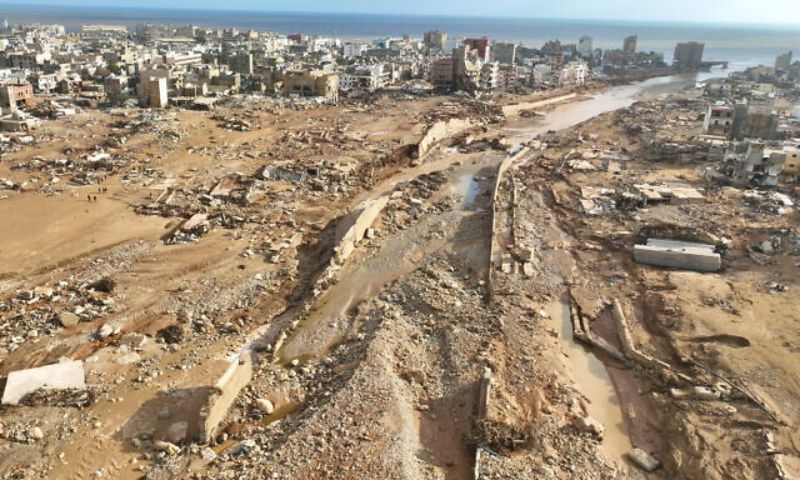TRIPOLI: In the wake of the devastating flood that wreaked havoc on the Libyan city of Derna, residents and rescue workers find themselves grappling with the grim aftermath, struggling to manage the thousands of corpses either washing up on the shores or buried under rubble.
The catastrophic event, triggered by torrential rains causing dam breaches and widespread flooding, has inflicted immense loss and suffering upon the already beleaguered nation.
The World Health Organization (WHO) and several aid organizations are urgently calling upon Libyan authorities to refrain from burying flood victims in mass graves. Such an approach, they caution, could exacerbate long-term mental distress for affected families and pose significant health risks if the graves are situated near water sources.
A recent United Nations report highlights that over 1,000 individuals have already been interred in mass graves since the catastrophe struck. Libya, a nation torn apart by a decade of conflict and political instability, is now grappling with the grim aftermath of this natural disaster, with thousands dead and many more missing.
The devastation is overwhelming, with bodies strewn across the streets, washing ashore, and concealed beneath collapsed structures and debris. Bilal Sablouh, the International Committee of the Red Cross (ICRC) forensics manager for Africa, described the gruesome scene, revealing that in just two hours, they counted over 200 bodies on the beach near Derna.
Ibrahim al Arabi, the health minister of Libya’s Tripoli-based western government, expressed deep concern about groundwater pollution, contaminated with a mixture of water, corpses, dead animals, refuse, and chemical substances. He implored people to avoid approaching wells in Derna due to potential health hazards.
Mohammad al-Qabisi, the head of Derna’s Wahda Hospital, shared fears of waterborne diseases spreading rapidly and highlighted ongoing efforts at a field hospital to treat individuals with chronic illnesses requiring regular care. Although concerns persist regarding the potential spread of waterborne diseases, no cases of cholera have been reported as of now.
Derna, at the epicenter of destruction in Libya’s east, witnessed the utter obliteration of neighbourhoods when dams above the city broke, and the ensuing flood demolished entire residential blocks, catching families off guard in their sleep.
According to the International Organization for Migration mission in Libya, over 5,000 people are presumed dead, with 3,922 deaths registered in hospitals, and more than 38,640 individuals displaced in the flood-affected region. However, officials fear that the actual death toll could be significantly higher.























